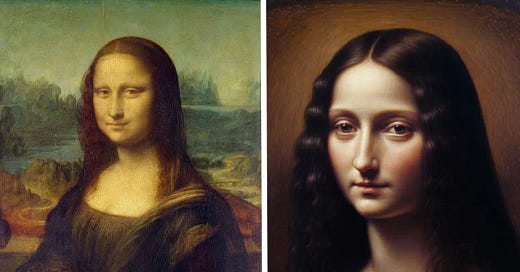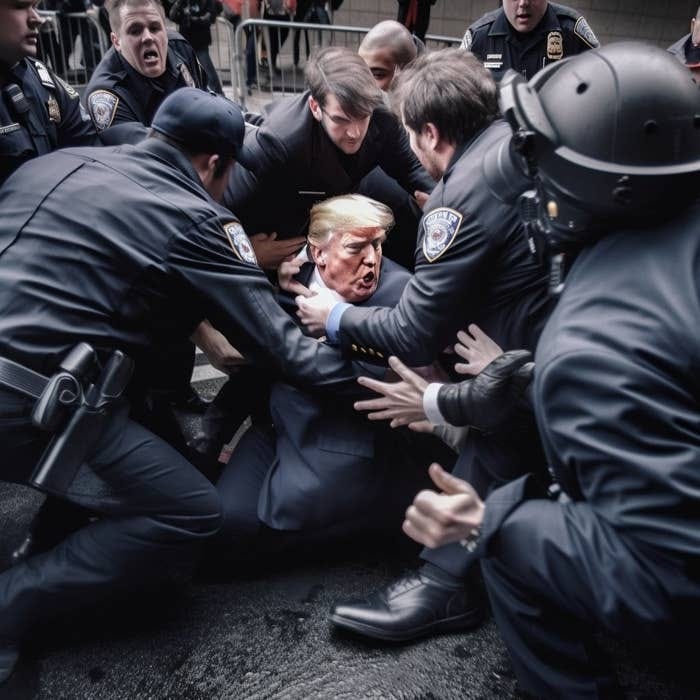Hi!
Ari here, with a new entry of my newsletter for you.
We’ve got lots of ‘hard news’ coming: the Supreme Court term ending with a decision on Trump’s coup trial, the first Presidential Debate on Thursday. This piece steps back from the crush of news to look into the future, and really the present…
And thanks for your interest — you can subscribe here for all newsletter editions and my annual subscriber Zoom Call:
You tell me that it's evolution, well, you know...
Our history, politics and culture are shaped by technology. Nowadays, when people get nostalgic about pre-digital mediums — like reading books in print! — the age and nostalgia for those printed pages obscures a simple truth.
Those books were cutting edge technology when they debuted!
In the abstract, we know that. The printing press was a huge breakthrough. (It created the first mass news, disrupted power structures, fed The Renaissance, spread Martin Luther’s reformation, jumpstarted the spread of scientific teachings challenging religious and political dogmas, etc.) That was the new tech of its time… just like later breakthroughs from the industrial revolution to the Internet.
Technology does not “determine” a single outcome for society, but it does drastically shape what is possible.
Today, the pace of technological growth is accelerating faster than any time in history. We may be living through another “revolution” on par with those developments, but faster and even reaching farther, because of artificial intelligence (AI).

Don’t leave politics to “everyone else”
AI is swiftly moving from experimental tech to mass application. Just as politics is too important to just be left to “other people,” I think this tech is probably too significant to be left to “techies.” (Many of them even say that.)
Like past breakthroughs, it may shape our lives, politics or history in profound ways. So it matters who controls it. And it’s hard to impact who controls it without even understanding it.
AI’s impact is already huge. What’s the evidence for that? Consider just 3 measurable facts (out of many more):
This month, the most valuable company in the world became an AI company (Nvidia).
It surpassed Microsoft (!)… a computer company that reemerged as a top company because it shifted to focus on AI. (Microsoft backs OpenAI, which powers ChatGPT and other popular, free consumer AI products.) So this tech, and these companies, are measurably more valuable than every other company in every sector on earth, with the markets banking on their further future growth (for what that’s worth).
People are now adopting AI far faster than previous technology, compared to personal computing or cameras. It took about about 150 years for the total number of photographs on earth to reach the large number of 15 billion. Since the launch of these AI systems, which people can use to generate their own “new” images, 15 billion such images were generated in a single year! Bananas!
(Everypixel Journal/Fast Company).
There are many more data points like that. You could scream them out, or write them in ALL CAPS, like an unhinged post on “TruthSocial,” and still not capture the full impact.
AI is here, people are using it on many things, and computers are using it on us. So there’s power, promise and peril here. The pros include gains in safety and medical analysis with fewer errors — saving lives — and leveling the playing field for people who have less money, and fewer technical skills. The risks include everything from decimating jobs, or our sense of humanity, to the “doomsday” scenarios imagined in 2001: A Space Odyssey — a supercomputer going rogue to kill humans the same way it might automatically empty a “deleted items” folder on a desktop. (“Efficiency!”)

Why even keep reading?
So that’s… a lot. But extreme hypotheticals are only one way to understand these tools.
From here out, I want to dive into a single artistic application. AI is disrupting creative fields from text to images, impacting culture and art now, whether people realize it or not. AI’s ability to sample, remix and “generate” images is extraordinary. Take this recent Cosmopolitan cover:

Cosmopolitan magazine published this AI cover, with an artist collaborator, and emphasized it took about 20 seconds. AI can draw on billions of images that already exist, so if you prompt it for a different take on Mona Lisa, or The Lamentation of Christ, it can give you this…
Many of these tools are free, and as mentioned, tens of millions of people are experimenting and creating billions of images. The free access means that people who don’t usually have the means to make digital images can now enter this space. We don’t know if this is anything like the printing press yet. We do know studies show images are more influential for most people than words, and people are already using these tools to express commentary and criticism (as artists have for centuries).
Long before Donald Trump was tried and convicted in New York, people were imagining his arrest — a kind of modern “political cartoon” — as commentary. Here are two examples that were shared many times online…
AI-GENERATED “ART” — NOT REAL PHOTOGRAPHS:
We have seen technology democratize speech before, from the printing press to blogs to social media. (You’re reading a digital newsletter, so you can surely think of pros and cons to those shifts for politics, art and civil discourse.)
When I paint that masterpiece…
For creativity, AI uncorks previously unfathomable options.
It can be simple — to generate this image, I typed this text: “Picasso painting of bob dylan”
Some people may see a real likeness of Dylan in that face (look closely!) — or find it fascinating to imagine how a deceased painter might render Dylan. Others may find this a long ways from interesting, let alone “art.”
Creatively, though, if art has any constant, it might be experimentation with new mediums, methods and ideas. The advent of the camera certainly upended portrait painting, but it’s hard to even imagine “resisting” cameras now — or claiming that photographs have “no value” — creative, artistic or otherwise. (That said, snapping pictures is not the same as oil painting, and few people seem confused about that.) In a society that has long valued images, and communicated through them, we are likely heading for some major and fascinating changes.
So that’s an outlook from one altitude. Then there is fairness.
These AI tools are using humans’ work. They require vast amounts of human “content.” That’s what they are built on.
So one can say they use, remix, harvest or combine that work to “generate” an essentially different or new image.
Or, one can say they steal the work.
The difference is not a matter of language, or interpretation. It is a matter of law and money. Remember how top AI corporations are now worth billions, and more than any other companies? Their tools are certainly powerful and in demand. But how much of that money is a transfer of the huge “value” of existing humans’ works — images, text, and otherwise — away from creators and towards these companies, who have built and unleashed systems outpacing now antiquated copyright laws, or even public knowledge and understanding about what the companies are doing, and how to react? (Remember that point about "leaving politics to others”?)
Some creators are suing. That is understandable but tricky, because it requires using last century’s laws to resolve the conflicts of the future. A few companies have struck content deals with AI companies, like the Wall Street Journal. It’s clear that new laws are needed for AI, from this issue to public safety, but as you probably heard, Congress can barely pass the required annual budget. So this is one of several AI breakthroughs that poses huge challenges with few solutions. And the status quo leaves the power with the companies.
Someday everything’s gonna be different
This topic is just one piece of a much larger picture. AI is often greeted in almost absurdly binary terms — “no one can resist the future,” “this will kill us all”!
I think the truth is more nuanced, and easier to see through specific examples. Expressing concern about AI’s impact does not make one a “resistant luddite.” As you can see from this piece, and the images I asked AI to “generate,” I find this all very interesting, and potentially creative! I also think any system that takes work, credit and value away from hundreds of millions of humans across history needs a lot more than “fine-tuning.”
Sooo, what’s the solution? (1) That’s a whole another essay. (2) I don’t claim to have it right now. (3) But as a smart human (not robot) once said:
“A problem well-stated is a problem half-solved."
That’s from Charles Kettering, the renowned inventor with over 180 patents. The legal patent system protected his work and research, while supporting plenty of profits during his many years at General Motors. We could ask AI what he might recommend for these problems in this new arena…. I bet it would be a system where he and his family get credit and revenue for his hard work.
P.S. What did you think of these AI images? Do you think creators should get more credit and revenue when their work is used by AI?
Do you like these longer, random essays I do for the newsletter, or is too far afield? : ) Let me know in the comments and I’ll read them, and reply to some as always..











Yes I believe creators should get more credit and revenue for their AI generated work. I have concerns about the abilities of AI leading to a decrease in creative processes and decrease in the thrill of curiosity. It’s a lofty concept to try to figure out how to regulate AI so that its applications don’t diminish people. I can see some real benefits to society but my doubts are with our political leaders to manage this technology. That sounds kind of cynical; maybe this will be their moment of success.
“Resistance is futile!” It pains me to say that because, even given the benevolent advancements in areas like healthcare, AI is still not our friend. Someone will always benefit—and it won’t be us (as evidence already by Nvidia and Microsoft). To paraphrase Dr. Ian Malcolm in Jurassic Park; “You guys were so wrapped up in finding out if you could do this, you never stopped to ask yourselves if you should.” The same, I think, haunted Oppenheimer after the bombs were created. But, this is what science does.
Back to the Borg—I’m reminded of how the Borg were ultimately defeated thus proving their premise of futility wrong—they were bested by humans who could think creatively without algorithms and by an Android whose only wish was to become human. Imagine that. We could all benefit from re-learning our Star Trek.
I LOVE reading you here, Ari. And I have loved watching your show as you help us understand the nuances in the law as it pertains to our current era.